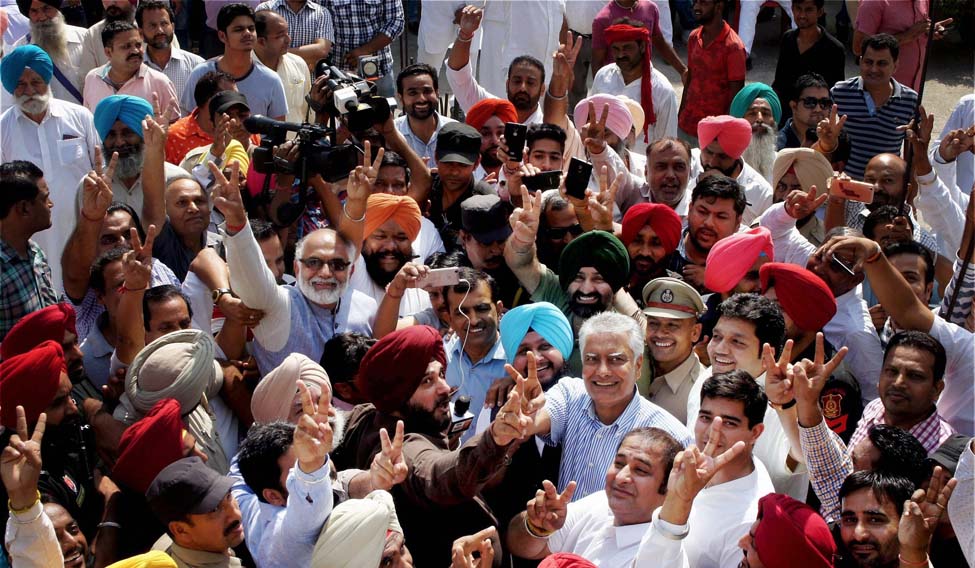The past week was action-packed, to say the least. The saffron party faced a series of humbling electoral defeats. In Gurdaspur bypolls, the Congress wrested back their erstwhile stronghold with a record margin; in Vengara bypolls, the Indian Union Muslim League (IUML), a staunch Congress ally, registered a comfortable victory and pushed BJP into the fourth place.
An unexpectedly aggressive Congress veep discovered a new favourite past time—baiting Prime Minister Modi with hilarious one-liners on the campaign trail (and Twitter, which the BJP considers its personal fiefdom).
Modi ji quick; looks like President Trump needs another hug pic.twitter.com/B4001yw5rg
— Office of RG (@OfficeOfRG) October 15, 2017
Amazing transition from Beti Bachao to Beta Bachao
— Office of RG (@OfficeOfRG) October 10, 2017
जय शाह-'जादा' खा गयाhttps://t.co/LjB7VJtkQB
These pessimists are going global. Why don’t they just go away? https://t.co/bhcD2g7KLv
— Office of RG (@OfficeOfRG) October 12, 2017
The Congress is euphoric over the wins, and leaders are pointing to the enormous margin (over 1.9 lakh votes) by which candidate Sunil Jakhar won the seat. But, what implications do these victories hold for the grand old party? Are they portentuous omens for the BJP or an aberration that the saffron party would be glad to see the back of? Is the shoe on the other foot now?
For the Congress, the win means that the party has wrested back a traditional stronghold. The Gurdaspur Lok Sabha constituency, with nine assembly seats, has tilted more in favour of the Congress than any other party (the constituency has gone to polls 16 times, and the BJP has won only five of them). It was only after the advent of the charismatic filmstar-turned-politician Vinod Khanna that the saffron party gained a foothold in the area.
Congress faced the first upset in 1997, post-Emergency, when Y.D. Sharma of the Janata Party won. Khanna, contesting under the BJP banner, was elected four times— in 1998, 1999, 2004, and 2014. The BJP faced a defeat in 2009, as Chief Minister Amarinder Singh's bete noire, former state Congress president Pratap Singh Bajwa, emerged victorious in 2009. Khanna, however, trounced the latter in the 2014 Lok Sabha polls. It was Khanna's demise earlier this year which necessitated the bypolls.
In this election, while Bajwa tried to secure a ticket for his wife, the party favoured Jakhar. The BJP fielded businessman Swaran Singh Salaria, even as there were speculations that the party would field Khanna's wife Kavita.
Jakhar's tremendous victory, by itself, should make the Bharatiya Janata Party sit up and take note. But the margin of victory—an unprecedented 1.93 lakh votes—came as a surprise for even those who predicted a Congress win. To put things in perspective, the biggest lead that Khanna ever secured was 1.36 lakh—in 2014, at the height of the Modi wave.
There is yet another reason why Jakhar's victory is so impressive. He was leading in all nine assembly segments in the Gurdaspur parliamentary constituency right from the first round of counting, an extraordinary trend on a result day.
What were the electoral mechanics that led to this Congress victory? Jakhar, though the president of the Punjab Pradesh Congress Committee (PPCC), was not a leader with a pan-state acceptability. With roots in Abohar in south Punjab, bordering Rajasthan, Jhakar's victory in Gurdaspur—a constituency in the northern tip of the state—was never a guaranteed one.
The Congress party's political strategy was straightforward. Chief Minister Amarinder Singh did not sit back and relax. Even before the bypolls were announced, he deputed a trusted subordinate to set up camp in Gurdaspur. Amarinder was given a free hand, and Jakhar's clean, pro-farmer image came as a boost. Health Minister Brahm Mohindra was assigned the overall charge of the constituency. The seven Congress MLAs from Gurdaspur parliamentary constituency were assigned overtime in their respective turfs. In tandem, the measures worked like a charm.
Outwardly, the BJP leadership in Delhi is undaunted by the defeat. But, according to sources, discontentment is brewing in the Punjab unit over the choice of candidate—Swaran Salaria. The late actor Khanna's wife Kavita was their favourite; she had taken charge of the constituency after her husband's passing.
The BJP leadership in Chandigarh also blamed their allies, the Shiromani Akali Dal (SAD). The Akalis stuck to their stale response—the government had won the bypolls by misusing official machinery.
Is a Congress revival on the cards in Punjab? Amarinder Singh optimistically described the victory as a “precursor to the revival of the Congress at the national level”. In fact, he went to the extent of suggesting that Gurdaspur is for the party what Chikmagalur was for Indira Gandhi in the 70s—when she made a spectacular comeback. “In parliamentary elections, the voters tend to respond to the performance of the Central government, so we have every reason to believe that this is a verdict against the BJP government and Prime Minister Modi's governance, “ said minister Mohindra.
Is this is a sustainable political trend? Only time, and the results of the upcoming Himachal Pradesh and Gujarat assembly polls will tell.




